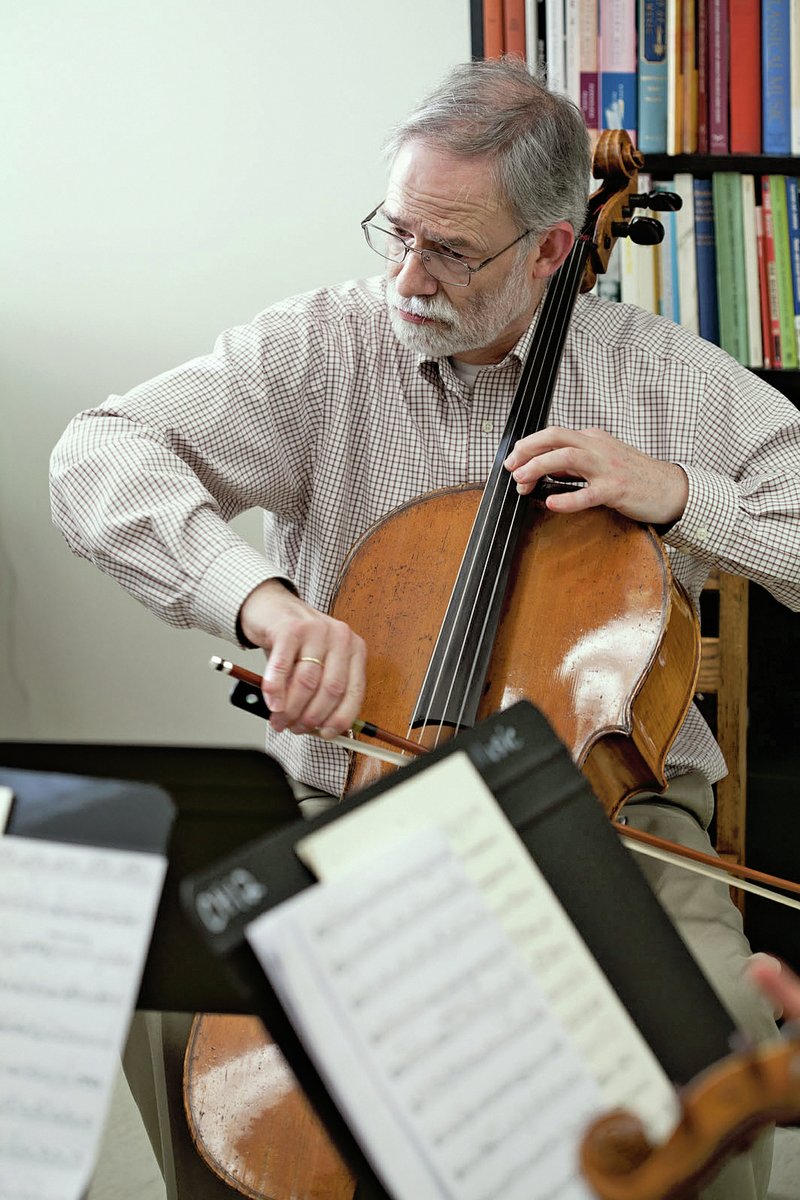Stephen Gates has been playing cello since he was 7 years old.
"So for exactly 60 years I have been either practicing or being told I ought to be practicing or feeling guilty for not practicing," the University of Arkansas professor emeritus says, only half joking. On this day, he's been in rehearsal for five hours and is heading home to practice through the evening for the KUAF/Fulbright Summer Chamber Music Festival. The seventh annual series started last night, and Gates will perform in two more concerts -- the final one featuring Ryan Cockerham's "Front to Back" in his honor -- before he wraps up his commitment to the UA.
FAQ
KUAF/Fulbright
Summer Chamber Music Festival
WHEN & WHERE — 7:30 p.m. Thursday in the Stella Boyle Smith Concert Hall at the University of Arkansas & 7 p.m. June 5 in the Great Hall at Crystal Bridges Museum
COST — Free
INFO — 575-4701
"Since our first concert in 2009, we have attracted full houses to virtually every concert," Gates says. "In some cases we have had standing room only, and in a few instances, less than that."
Gates says even when he and violinist Er-Gene Kahng began discussing a chamber series "a mere seven years ago, there was very little to do in the summer, especially in the arena of classical music. Wouldn't it be nice, we thought, if we could put together a series of chamber music concerts, make them accessible to everyone and find a way so the performers would still be paid for their participation? And it worked out very well."
They deliberately chose not to include a teaching component in the festival, Gates says, because they wanted to focus on the joy of playing.
"Chamber music is the ultimate musical collaboration and symbol of harmonious communication," Kahng says. "More so than any other form of music-making, it perhaps informs both musician and audience about the power of successful communication and successful relationship-building. Its success requires thoughtfulness, honesty and harmony between people that is rarely achieved without hard work. It requires accommodation, flexibility, vision and generosity.
"Due to the smaller nature of chamber music (compared against an orchestra, for example), I have always personally felt that it was a more intimate and honest vehicle to share the vessel of music."
Kahng says she cannot imagine the future without Gates, who has taught at the UA for 42 years.
"I have never known my chamber music experience here without Dr. Gates' presence and verve," she says. "Luckily, we are neighbors, living only about five houses down, so I am hopeful for many future, impromptu rehearsals where I will be able to enjoy Dr. Gates' freshly baked pastries, black coffee and some violin-cello duos!"
Gates says he honestly does not know if he will continue playing, even though his doctorate -- he is a doctor of musical arts, not a more traditional Ph.D. -- is in cello performance.
"I cannot imagine getting up and practicing scales on the day after I retire," he says, again only half-joking.
Then again, Gates didn't expect to stay in Arkansas forever when he moved to Fayetteville in 1973, armed with an undergraduate degree from Harvard and a master's from Yale School of Music.
"What made me take it was it was what I wanted -- a college teaching job," he recalls. "And yes, I did think I'd gone to the end of the earth. I learned otherwise but slowly."
Over the years, Gates served on the Walton Arts Center Board, the North Arkansas Symphony Orchestra Board and as chairman of the UA music department. He and wife Fliece adopted two children and now have two grandchildren. He also has a cabin at the lake he's spent very little time enjoying, he says, and hobbies like woodworking and bread baking he thinks he might like to explore.
"It feels like the right decision," he says. "It feels good in my stomach when I think about it."
"I have always felt that there was a great humanity in how he approached and thought about music," Kahng concludes. "I think he thinks (and has thought) a lot of about being human, how to be human, what it means to be human, and considers how best this can be expressed through the voices of other composers, past and present.
"Throughout our years working together, Dr. Gates, without being didactic, has shown and taught me so much about the nature of humanity."
NAN What's Up on 05/22/2015

